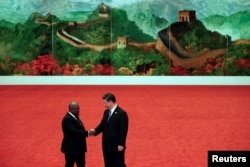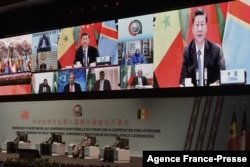Under President Xi Jinping, China’s engagement with Africa reached new heights, economically and diplomatically.
During nearly 10 years in power, Xi’s trademark Belt and Road Initiative (BRI) saw massive infrastructure projects implemented across the continent, his government tripling China’s financial commitments in the first Forum on China-Africa Cooperation (FOCAC) held under his mandate, and also convinced more African governments to support Beijing’s positions at the United Nations.
With Xi now set to be confirmed for a third term in power at this month’s Communist Party Congress in Beijing, analysts say what happens in the meeting with Xi and other top leaders is closely watched by African governments. .
“It matters a lot and this is because relationships with Africa … tend to be very personalized, so if the leader at any given time has a vested interest in Africa, depending on how that leader perceives the African continent, you’re going to to have very stable and multifaceted relationships,” Paul Nantulya, a China expert at the Africa Center for Strategic Studies in Washington, told VOA.
Under Communist China’s founder, Mao Zedong, China and Africa had a close relationship, especially as Beijing supported liberation movements on the continent. But under his successor, Deng Xiaoping, China focused more on engaging with the West and internal reforms than on relations with Africa, Nantulya said.
“Xi Jinping has brought the China-Africa relationship to the highest level it has ever been since the Mao Zedong era,” he said, adding that with Xi he will surely get a third five-year term, and maybe even stay in power. longer. , he hopes those relationships will grow even stronger.
Xi himself can only run for a third term this year because he changed the constitution in 2018 to allow it. Some analysts say he is preparing to be a leader for life.
“It could inspire a mood in Africa to further change or manipulate constitutions so that party leaders can stay in office, this has been a trend that we have unfortunately seen returning to the African continent,” Nantulya said.
But other analysts were less convinced that Xi represents the direction of China-Africa relations.
“It’s hard to disentangle the impact of an individual from the overall trends of China’s globalization and the changing demand and absorptive capacity on the African side,” said Deborah Brautigam, director of the China Africa Research Initiative at Johns Hopkins University. .
Cobus van Staden, a China expert at the South African Institute of International Affairs, said Beijing’s engagement with Africa predates Xi and is driven by many actors.
“Xi’s continuation as party chief is important, but I think it does not fundamentally change the nature of the engagement itself,” he said.
However, Van Staden noted, Xi has “refined and redesigned” the relationship of the two regions, and defines the diplomatic tenor of the engagement.
Diplomatically conquer the global south
The success of China’s soft power proposals in Africa has been illustrated by the number of countries that have followed Beijing’s lead when it comes to remaining neutral in Russia’s invasion of Ukraine. Analysts say that China certainly wants the nations of the so-called global south in its ideological corner and that the United States and Europe have been struggling to catch up.
“My view is that the Xi administration has increasingly created a pro-China and anti-China world, where countries are divided between those who seek pragmatic relations with China for their own benefit, accept its transactional approach to diplomacy, and, in general, care much less about values – and then the other part of the world, largely around the US and its close European allies and others, who of course believe that values matter,” he said. to VOA Kerry Brown, Professor of Chinese Studies at King’s College London.
“China has become less and less interested in relationships with the latter group where it involves lecturing or appearing to belittle China, and more aware of having a wide web of alternative relationships, particularly in the global south where these issues are not part of of the mix,” he added.
Steve Tsang, director of the China Institute at the University of London’s School of Oriental and African Studies, said pursuing relations with those countries was likely to remain a foreign policy priority for Beijing.
“Xi is also determined to compete against the West or democracies, and to do so, his China will need to court African countries, particularly autocracies,” Tsang said.
However, he noted, “Under Xi, China’s economy is likely to slow as its policies have not been helpful to growth. A slowing economy will mean less funding for the BRI and therefore less money for spend on courting African countries.
Changes in Chinese loans to Africa
Amid economic woes in the country and the Chinese Communist Party’s unpopular “COVID zero” policies, as well as constant accusations of “debt trap diplomacy” by the West over China’s loans, economists say the loans have already declined, leaving African markets vulnerable. At the latest FOCAC regional trade forum in 2021, Beijing announced $20m less in funding for the continent – could China be backing down on Africa?
“China will never move away from Africa, for political and economic reasons. But at the moment, the old model of infrastructure-driven financing loans seems unsustainable, given China’s economic changes,” said Yun Sun, program director of China at the Stimson Center, he told VOA.
The nature of the engagement is already changing, with Beijing moving away from hard infrastructure projects like roads and railways, towards investment in information and communications technology, agriculture, green energy and other areas in Africa.
Another means by which China under Xi continues to increase its soft power on the continent is through the promotion of its governance and party model among politicians in Africa, including starting a political party training school in Tanzania this year that, some critics fear, it could undermine democracies in the region. .
“The training of African politicians and officials will continue despite the reduction of the BRI,” Tsang said.






